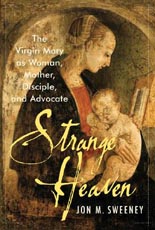Mary, the young and simple woman who was the mother of Jesus, has become the object of deep devotion and a major subject in Catholic theology. As Jon Sweeney (Born Again and Again) points out in the introduction to this fascinating survey of the Virgin Mary, the mythological dimensions of her life have the power to gather armies and to rally causes. Her womb was a "strange heaven," in the words of the poet John Donne, and in her life after death, she has been even more communicative and powerful.
In chapters on Mary in the Bible, Sweeney covers the virgin birth, the legend foretold by the Hebrew prophets, Mary as the First Disciple, Paul's silence about Mary, her presence in the non-canonical gospels, and "mystical glosses that further added to the myth." There certainly has been no shortage of books recently on these subjects, plus the movies The Da Vinci Code and The Nativity.
Sweeney kicks into high gear with a section on The Blessed Virgin Mary in Catholicism, where he discusses her many apparitions and visitations, praying the rosary and other spiritual practices, feasts, difficult dogma about Mary, and the unfortunate teachings of Bernard of Clairvaux and others. The many mysteries about Mary increase and deepen as the centuries roll by. Sweeney notes that the word ""joy" often crops up when Christian mystics describe the Virgin. "It is said that Christ looks on her with joy, and also that she looks on Christ, and us, even now, with joy."
One of the true delights of the present spiritual era is that more Protestants, following the example set by reformer Martin Luther, are coming to a deeper appreciation of Mary. She is being heralded as a peacemaker and advocate of justice. Best of all, the stereotype of Mary as the perfect mother and ideal woman subservient to men is being replaced by fresh images that reveal the feminine face of God and the nurturing spirit within us all.
